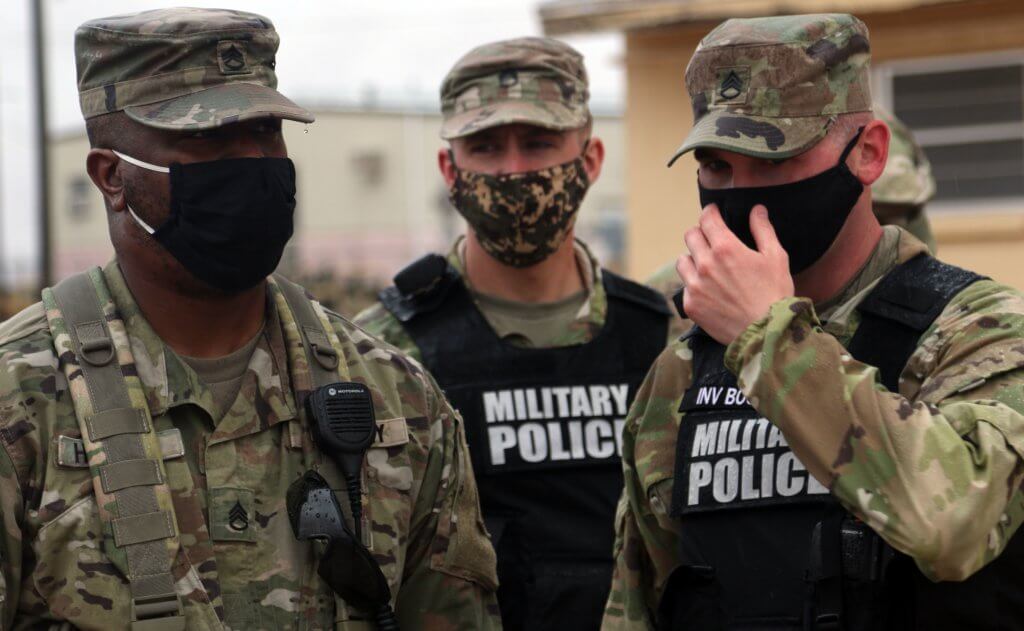National Guard and reserve personnel believe experience and promotion potential are the most important factors for volunteer deployments.
“Experience is invaluable,” said Staff Sgt. Timothy Brown. “It’s all about being able to articulate the experience and knowing how to use it, and work with different people, with a lot of things that go into it. I would definitely recommend at least volunteering once for a deployment.”
Brown, of the 1776th Military Police Company, volunteered for three deployments – Afghanistan (2013-14), Cuba (2018-19) and Lebanon (2021-22) – for the experience of being newly promoted and to lead his fellow junior soldiers.
Other pros include civilian job security and personal growth.
Civilian job security
Deployments (whether voluntary or not) also allow service members to maintain their civilian job in an equivalent position and continue to earn seniority due to the Uniformed Services Employment and Reemployment Rights Act (USERRA). USERRA is a federal statute that protects service members and veterans civilian employment rights, according to The Department of Labor.
The DOL states that returning service members are to be reemployed in the job that they would have attained had they not been absent for military service, (the “escalator” principle), with the same seniority, status and pay, as well as other rights and benefits determined by seniority.
It also requires that reasonable efforts (such as training or retraining) be made to enable returning service members to qualify for employment. If the service member cannot quality for the “escalator” position, he or she must be reemployed, if qualified, in any other position that is the nearest approximation to the escalator position and then to the preservice position. More information about the rights that govern USERRA can be found on the DOL website.
Personal growth
Service members also can take advantage of downtime to work on personal growth while deployed. This can be in the form of focusing on their physical fitness, taking college classes or certifications or learning hobbies.
“I completed 30 classes/90 hours of training on Joint Knowledge Online (JKO),” Brown said of the Joint Staff J-7 program that supports DOD training and education requirements. “So I was able to gather up some promotion points that way. “We [also played] basketball with the Lebanese Armed Forces.”
The JKO courses will help increase promotion points on his annual NCO Evaluation Report.
Sgt. 1st Class Alan Mullin, also of the 1776th Military Police Company, has volunteered for two deployments – Cuba (2018-2019) and Afghanistan (2011-2012).
“I made good use of Duolingo by learning Arabic,” Mullin said, referencing the free mobile app that offers lessons on more than 30 languages. “We have a large Arabic speaking population in Michigan. If I do anything [with the] public or work overseas, it will help.”
A homefront conversation
But on the downside, volunteering for deployments includes time away from loved ones, a possible decrease in pay (that could be offset by extra pay and benefits that guardsmen qualify for) and deployment uncertainty.
1st Lt. Cody Travis, of the 1776 Military Police Company, volunteered for his first deployment to Lebanon (2021-2022) and recommends consulting with family and friends first.
“If you’re interested, talk to your family about it,” Travis said. “Talk to any significant other, [or] your friends about it. See what their input is, if they support you. I think you should … so if you get the opportunity to do it, jump on it. You will not regret it.”
The military installation family center also has resources and programs to assist soldiers and their family as they prepare for upcoming deployments, as well as returning home. Contact your first sergeant for more information.
Changes to pay
Service members also experience a decrease in pay when deployed due to leaving their civilian job for their National Guard or reserve rank while deployed. However, they receive basic allowances for housing and substance to make up the gap.
Per diem can offset the decrease in pay, and if deployed to hostile locations, combat pay and hazard duty pay can also help. Family separation pay is also given to service members with dependents. Some companies, like the Michigan Department of Corrections where Brown works, might offer service members a monthly stipend as a supplement. Check with your company to see if they offer monetary benefits to deployed service members.
“Being in the military isn’t about making money, it’s about making a difference,” Brown said. “It’s about being a part of something bigger than myself and getting to do cool stuff from time to time.”
Those interested in volunteering to deploy can contact their unit readiness noncommissioned officer, their leadership and/or create a profile on the MOBCOP Tour of Duty website.

